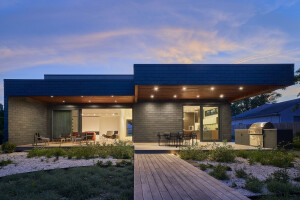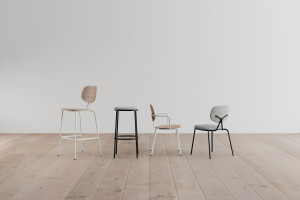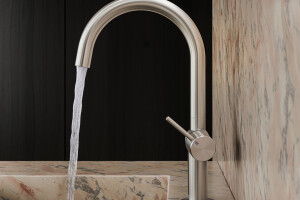Brief Bio of the Architect(s)
Our studio seamlessly combines architecture, interior, and furniture design into thoughtful, functional, and timeless projects.


Adopting a conceptual approach, without adhering to a specific style, signature, or rigid rules, we engage in dialogue with the existing environment and the user. Each new project begins with a deliberate naivety and curiosity. Be it a program, material, or detail, we approach it without preconceived notions. Serendipity is as important as practical thinking. This flexibility allows us to create unique and meaningful spaces, striking the right balance between intuition and rationality.


specific conditions or wishes (living program) of the client?
Budget
Abundant light
Connection to the garden
Integration between the street and the garden
Specific desires such as corrugated metal and specific color choices
were highlighted from the outset
characteristics of the site or the house to be renovated/converted?
The house was entirely derelict, with few charming elements. However, the garden shed and remaining steel beams in the courtyard provided a starting point for the design.


The many shed roofs in the area and the materiality of the train station across the street influenced the choice of materials and colors.
final result, and firm's ‘signature’ in this project
As always, the design is the result of a close dialogue between us, the client, and the context of the existing building and environment. For this project, the client granted us significant freedom to explore unconventional materials and forms, evident in the bathroom and kitchen designs.


relation to its surroundings
In the early sketches, the shed roof typology was quickly introduced due to the remaining industrial architecture in the vicinity. This approach aligned with the client’s desire for abundant light and an industrial look and feel.
Given its visibility from the surroundings, maintaining a residential character was essential, achieved by applying a design language centered on single-family homes.


construction methods and materials
The client strongly favored corrugated metal as the facade material. Together, we decided on a steel frame structure with a focus on keeping it visible.
Steel frame for the extension combined with steel deck roofs
Material and color choices inspired by the nearby train station interior elements or materials that play a significant role


The interior design sought to harmonize raw construction elements with a softer overall aesthetic by carefully selecting colors and materials:
Visible wooden ceilings and floors (sanded)
Steel structure (columns and beams) in bluish-gray primer
Blue-colored polyester for the bathroom
Corrugated metal, stainless steel, exposed concrete, and lacquered


fronts for the kitchen and custom furniture
Red-pigmented poly-concrete inside and out
sustainability
Within the possibilities of an urban renovation, we fully prioritized sustainability:
Air-to-water heat pump with PV panels

Ventilation system D
Rainwater harvesting
Night cooling
What stood out to the most in this project
At times, it felt like we were creating a residential factory, which was both fun and challenging!
The client’s unconventional approach, favoring an industrial look and feel, allowed us to experiment with unique materials. Additionally, the collaboration between us, the client, and the skilled tradespeople involved made this project truly special.

Rinskopf
Architect Information
Name: Arthur Verraes in collaboration with Hannes Monserez
Firm Name: Atelier Avondzon in collaboration with Macadam Atelier
Address: Louis De Smetstraat 17, 9050 Ledeberg
Phone: +32 479 68 18 77
Email: [email protected]
Website: www.atelieravondzon.be
Social Media: @atelieravondzon
Photographer: Séverin Malaud









































